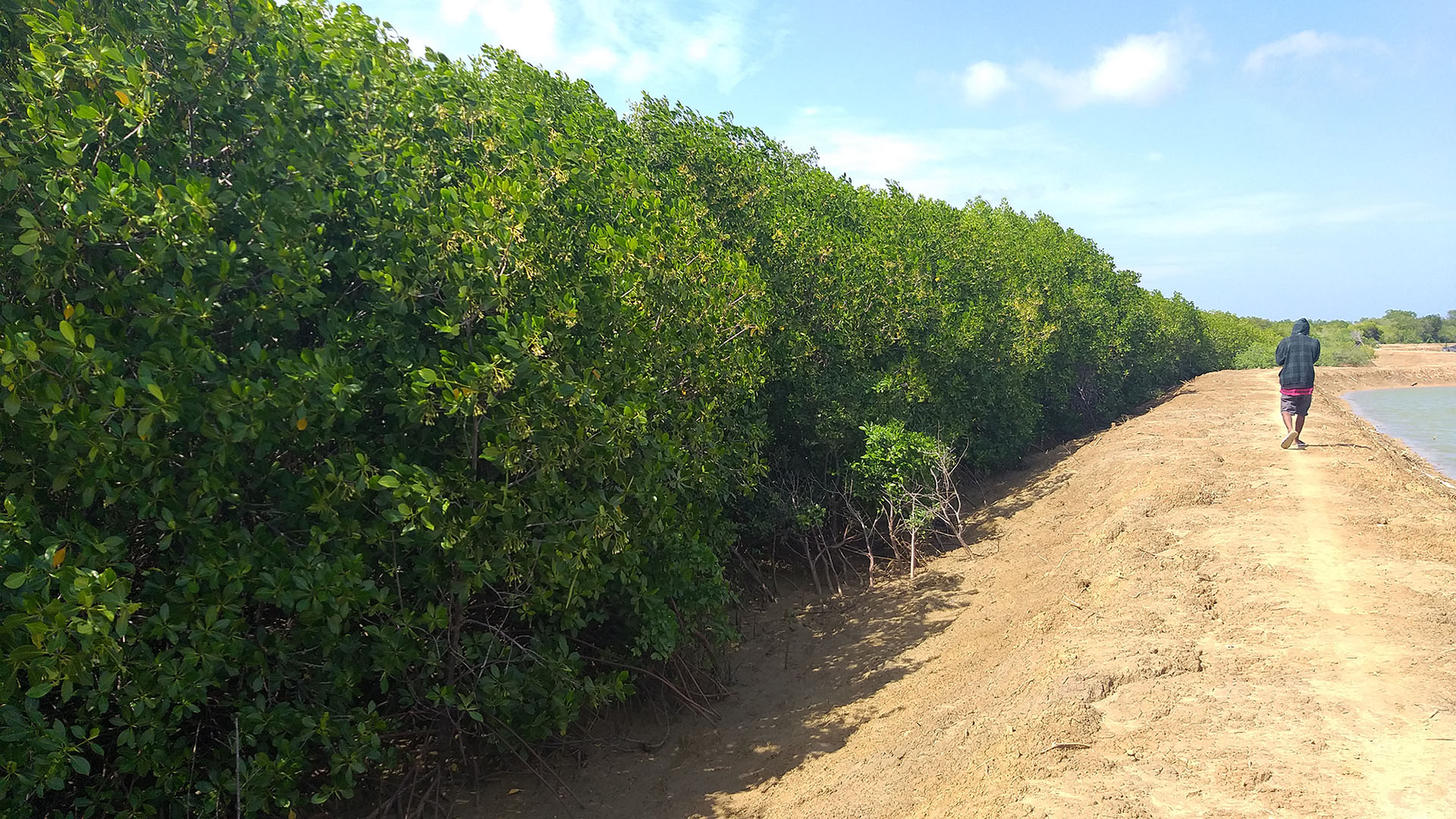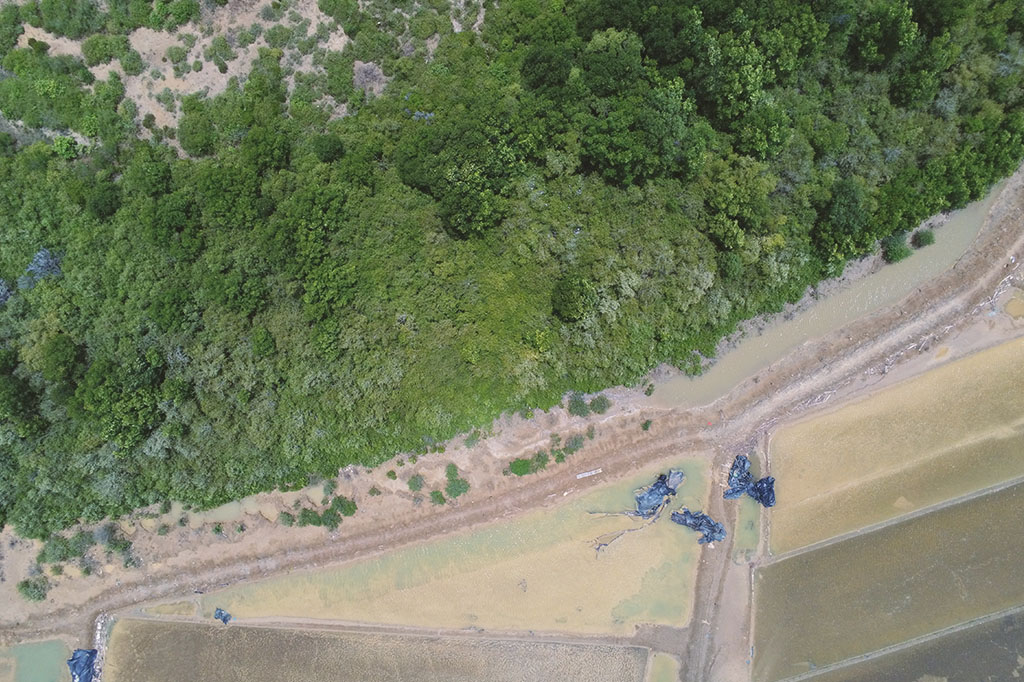AQUACULTURE, SEMARANG – Damage to mangrove forests in Indonesia is caused by human activities in earning a living. The sentence was delivered by a consultant Nedworc Foundation named Roel H Bosma. The existence of mangrove forests began to be replaced with ponds. In fact, the impact of mangrove logging does not only damage the habitat of marine biota but also people’s homes. “Compared to the Philippines, Demak Regency, Indonesia does not have a wide green belt. The mangroves in Demak did not protect the ponds, the mangroves were swept away by the waves and only a few rows remained,” he said. This was conveyed in the Webinar series 1 entitled Associated Mangrove Aquaculture (AMA) which was initiated by Wetland International and Ecoshape Foundation, with the contribution of partners from the Department of Aquaculture, Faculty of Fisheries and Marine Sciences, Diponegoro University (FPIK UNDIP), Blue Forest and Wetland International Indonesia.
Furthermore, Roel said that currently public awareness to protect mangrove forests is starting to increase. They already know the bad impact if there is no mangrove and the positive impact of the mangrove forest. Roel said that the total economic value of the mangrove environment can be predicted in various areas. This total economic value (TEV) is calculated based on four categories that vary according to local conditions. “For example, the TEV of mangrove forests in South Minahasa is estimated at Rp 500 million per hectare per year, only the best shrimp farms can benefit like that. Most traditional shrimp farms earn 10-40 times less,” he said Wednesday, June 2.
This webinar is in series 1 of a total of 3 webinar sessions packaged in the Aquaculture Supporting Mangrove Webinar Series. Resource persons from academic circles, namely Prof. Dr. Ir Sri Rejeki, M.Sc and Restiana Wisnu Ariyati, M.Si conveyed the background, objectives and approach of Associated Mangrove Aquaculture and the selection of suitable locations for Mangrove Connected Ponds. It was officially opened by the Dean of FPIK UNDIP, Prof. Dr. Ir. Tri Winarni Agustini, this webinar is one of the outcomes of the Research Collaboration between FPIK UNDIP and various agencies that are members of the Building with Nature Project with donors from the Ecoshape Consortium.

Photo: Mangrove in the fishpond area.
Affirmed, FPIK is very supportive for the development of technology and information in order to improve the quality of academics in higher education, collaboration with various stakeholders in sustainable development efforts. The same thing was conveyed by Dr. Sarjito, M.AppSc and the chairman of the Department of Aquaculture FPIK UNDIP, “that our department really supports the renewal and development of well proven technology, especially in the field of aquaculture which will continue to be carried out by researchers of this department to support environmentally friendly cultivation and in improving the coastal economy”.
Positive impact of ponds connected to mangroves
With the associated mangrove aquaculture system, said Roel H. Bosma, his party is trying to rebuild the green belt of mangroves in river mouths and tidal zones in Indonesia. With the hope that small farmers can get higher yields. Sri Rejeki also emphasized that the AMA concept is an effort to build mangroves for green belts, and not to plant mangroves in ponds. Restiana W Ariyati in her material said that the right location for AMA is a pond that borders the coastline and is on the edge of a river. This is useful in providing protection to coastal ecosystems which have an impact on increasing production and the economy of the community. With the position of mangroves outside the ponds and on the banks of rivers, mangroves will maintain water quality, protect ponds, capture sediment, protect beaches and riverbanks, and provide habitat for wild fish, shrimp, crabs and economic biota.
A resource person from Wetland International Indonesia, Eko Budi Priyanto, explained the construction of AMAs in more than 100 locations in 9 villages in Demak Regency. “It costs approximately Rp. 10 million for the AMA application until a strong embankment is formed,” he explained. Furthermore, Ira Wardani M.Sc, an alumni of Wageningen University who is currently working at Deltares, an independent institute for applied research in the field of water and subsurface, based in Delft, The Netherlands presented several designs of AMA ponds. By applying this concept, reducing the risk of water quality degradation and not disrupting production from aquaculture.
The general QnA session was guided by Lestari (Riri) Widowati as the host and moderator of this webinar. Riri conveyed the enthusiasm of the webinar participants with various questions from the speakers, the right type of mangrove, the function of mangroves as absorbing pollutants, changes in land function, land ownership and pond productivity are crucial issues. At the end of the session, it was also mentioned that this Webinar series will return with a different theme, namely Aquaculture Field School and Integrated Multi Tropic Aquaculture based on Tropic Levels on June 9 and 16, 2021.


Recent Comments